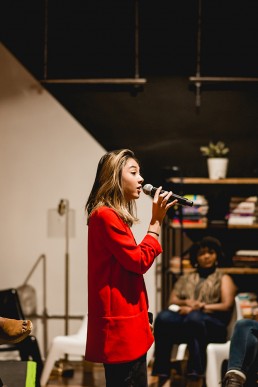OUR HISTORY
The Institute for Intellectual Property and Social Justice (IIPSJ) was conceived by Lateef Mtima during his years in private practice in intellectual property and commercial law. Professor Mtima created IIPSJ to explore how IP law and policy can be interpreted and applied as mechanisms for socio-economic and political inclusion, parity, and empowerment.
Challenging Conventions
Professor Mtima disagreed with the then-prevailing view that IP-related social deficiencies were social welfare problems; unable to be addressed directly through the intellectual property legal regime.
New approaches to these—and other social justice issues—may be revealed by viewing their symptoms through the lens of IP law.
1
Misappropriation of historically marginalized communities
2
Developing world intellectual property output
3
Traditional knowledge and expression
4
Inequitable access to medicines and knowledge

Our Story
Chapter 1: Pioneering IP Social Justice in the Legal Profession
In 2001, Professor Mtima developed the concept for an IP Social Justice Continuing Legal Education Program, which would expose practicing attorneys to intellectual property social justice issues, problems, and solutions, while at the same time instructing them in current developments in the law.
Collaborating with Tom Irving, a partner in the international IP law firm of Finnegan, Henderson, Farabow, Garrett & Dunner, LLP, they together devised the program’s scope, content, and two-day instructional format, through which experts from the bench, bar, and legal academy would deliver lectures and presentations in patent, copyright, trademark, publicity rights, and other areas of intellectual property practice, while interposing relevant issues and questions of social justice.
They agreed that the Howard University School of Law—given its historic legacy and hegemony in civil rights and social justice—would provide a venue most fitting for the inaugural program.
With the launch of the program in 2003, Finnegan patent attorney Esther Lim (today a partner in the firm) undertook what would become a permanent role as Program Chair, and Howard Law student and IIPSJ’s first Research Fellow Tameka Simmons (today an attorney specializing in intellectual property and medical employment issues) devised the program’s administrative and logistical structure, which remains in place today.
Chapter 2: IP Social Justice Scholarly Works and Programs
During this period, Professor Steven Jamar became IIPSJ’s first Associate Director, and collaborated with Professor Mtima in developing many of IIPSJ’s core scholarly programs. To commemorate the 50th Anniversary of the Brown v. Board of Education decision which desegregated public schools, Professor Jamar conceived the IP and Brown academic symposium, which was published by the Howard Law Journal. In 2010, Professor Mtima collaborated with Professor Jamar in the development of the IIPSJ Think Tank, the first and only think tank dedicated to examining the social justice implications of IP law, policy, and practice.
Chapter 3: IP Social Policy and Community Outreach
From its inception, IIPSJ has regularly contributed to the public discourse on IP social policy and legal developments, through testimony and submissions to governmental bodies and judicial proceedings, presentations at practitioner and academic IP conferences, and participation in online fora. IIPSJ has disseminated position statements on important IP policy questions such as the Google Books Project and the copyright “Orphan Works” problem, as well as on governmental actions and legislative proposals to shape contemporary IP policy, such as SOPA and PIPA. IIPSJ has also undertaken numerous community outreach initiatives, such as its IP Empowerment Summit, through which IIPSJ has partnered with the United States Patent and Trademark Office and other entities to present programs on community IP education, entrepreneurship, and social activism.
Chapter 4: Expanding the IP Social Justice Vista
As an accredited Non-governmental Organization Member of the World Intellectual Property Organization (WIPO), an agency of the United Nations based in Geneva, Switzerland, IIPSJ currently works to apply the principles of intellectual property social justice toward the amelioration of the global IP status quo. With respect to its domestic initiatives, the IIPSJ scholarly program was expanded in 2015 with the initiation of the First Annual IP Mosaic Conference, designed to promote socially progressive and diverse IP scholarship, and which is co-sponsored and hosted by Marquette University Law School.
IIPSJ also continues to provide support for major IP social justice works and publications, such as the Intellectual Property, Entrepreneurship, and Social Justice anthology, published in 2015. IIPSJ has also established a community outreach collaborative initiative with the Mack Performing Arts Collective (MPAC), a non-profit organization based in Houston, Texas, whose mission is to promote entrepreneurial endeavour in the performing arts, particularly in communities that are underserved.
With more than a decade of pioneering achievement in the field of intellectual property social justice, the scope of IIPSJ’s work continues to evolve and expand.
